How Can AI Be Useful In Mobile App Development In 2024?
Artificial intelligence (AI) is revolutionizing the process of developing, testing and optimizing mobile applications. Various AI technologies are making mobile apps smarter, more intuitive and better performing. In 2024 and beyond, AI will become integral to delivering next-generation app experiences.
Click on each corresponding link to jump ahead:
- AI-Assisted App Design
- Smarter Code Development
- AI Testing and Optimization
- Personalization with AI
- Iterative Enhancement
- Operational Efficiency
- Responsible AI Integration
- What is the Future of AI in Mobile Apps
- Will AI Replace Mobile App Developers
- How Will AI Impact the Next 5 Years of Mobile App Development
- What are the Ethics of Using AI for Mobile App Development
- What's Next?
For more information on how AI can positively impact your business, contact Profitworks:
1) AI-Assisted App Design
During the initial design phase, developers are leveraging generative design models powered by AI to prototype and iterate app interfaces rapidly. AI systems can generate hundreds of creative mockups meeting specified UI/UX criteria. These innovative ideas for AI mobile app development help finalize the look and layout faster.
App developers are also using VR/AR platforms integrated with AI to visualize and experiment with virtual prototypes early in the cycle. This enables faster concept validation. AI is also aiding the automatic generation of icons, graphics and other assets to enhance consistency and aesthetics while cutting down design time.
Key ways AI assists mobile app design:
- Generative design to rapidly create UI/UX prototypes
- VR/AR simulation for interactive prototyping
- Automated high-quality icon and graphic generation
- Layout optimization through machine learning
- Personalized design based on user preferences
2) Smarter Code Development
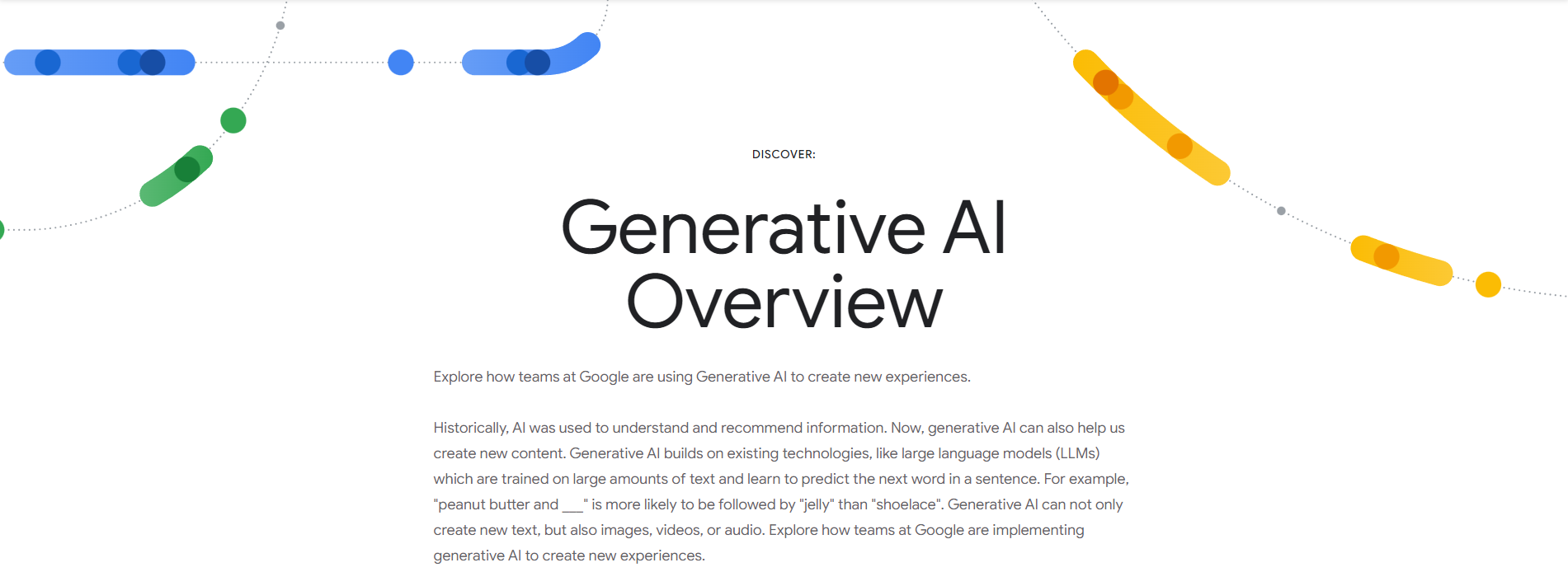
Source: Google AI
AI is augmenting mobile code development in powerful ways. Autocompletion tools based on machine learning aid faster writing of code by providing contextual, personalized suggestions to developers as they type. AI code inspection tools can analyze patterns and antipatterns in codebases to recommend improvements.
Code generation platforms can automatically produce whole classes and methods from simple developer prompts. This frees up developers from repetitive coding tasks so they can focus on higher logic. AI pair programming assistants can also review code, identify bugs, suggest fixes and improve code quality. These innovations are making app developers more productive.
Key AI applications in mobile code development:
- Autocompletion of code based on ML models
- Automated code refactoring and optimization
- Intelligent code reviews for finding bugs
- AI-powered code generation and reuse
- Virtual pair programmers for mentoring
- Natural language interfaces for coding
The value of the global AI market was estimated at $136.55 billion in 2022, and it is anticipated to rise rapidly over the next several years, with a compound annual growth rate (CAGR) of 37.3% from 2023 to 2030. Thus, it is not surprising that AI has found such a wide application in mobile app development.
3) AI Testing and Optimization
Testing mobile apps thoroughly across multiple scenarios is vital but time-consuming. AI-based test automation tools can simulate inputs and scenarios to identify bugs without intensive manual effort. Machine learning algorithms pinpoint areas in the code with high defect probability to focus testing on those high-risk modules.
AI can also continuously test apps after deployment by running through millions of real-world usage scenarios on virtual devices. This helps developers identify issues and release fixes rapidly. To improve app performance, AI profiling tools detect possible bottlenecks and suggest code optimizations.
4) Personalization with AI

Relevantly demonstrating AI bot for personalization
Source: Relevantly
To deliver hyper-personalized experiences, apps are integrating AI solutions like recommendation engines, sentiment analysis and natural language processing. These analyze user behaviours and interactions to customize the content, product suggestions and notifications.
Chatbots with conversational AI make mobile apps more intuitive. AI also powers visual search, multilingual support and voice assistants for effortless user experiences. With on-device ML advancements, personalization can now happen right on the user's phone for greater privacy.
Key personalization features enabled by AI:
- Contextual recommendations
- Customized content and notifications
- Predictive user interface optimization
- Multilingual support and sentiment analysis
- Chatbots and virtual assistants
- Voice and visual search
- On-device ML for private personalization
5) Iterative Enhancement
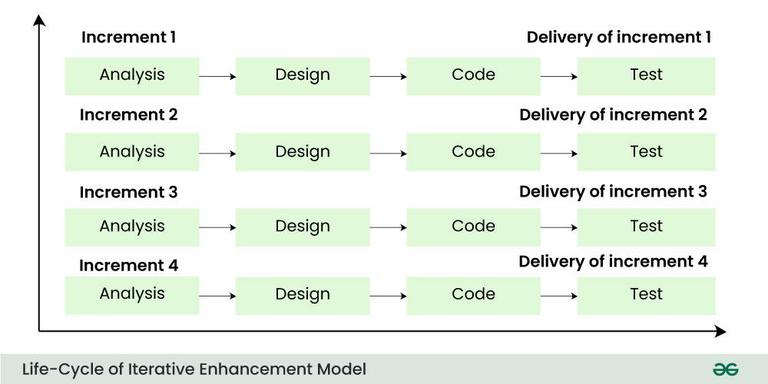
Source: Geeks for Geeks
The availability of rich usage data from millions of app installs enables continuous improvement through AI modelling. Analytics dashboards provide actionable insights to enhance engagement and conversion. By analyzing user pain points and feedback, developers can use AI to prototype and launch new solutions rapidly.
Automated A/B testing identifies the most appealing and effective UI variants. App store optimization with AI helps improve searchability and drive more organic installs.
Key iterative enhancements possible with AI:
- Usage analytics for engagement insights
- Automated A/B testing of UI changes
- Rapid prototyping of new features
- App store optimization
- User feedback analysis
- Real-time behaviour modelling
6) Operational Efficiency
AI is making app management more efficient. Smart anomaly detection identifies unusual usage patterns, performance issues and outages for rapid remediation. AI traffic allocation optimizes resource distribution across app versions.
Automating mundane tasks like build releases and infrastructure scaling enables developers to focus on innovation. Chatbots even handle some customer support activities. AI is key to efficient mobile app operations.
How AI improves mobile app operations:
- Anomaly detection for incident prevention
- Intelligent traffic allocation and scaling
- Automated build releases and updates
- Infrastructure optimization through ML
- Basic customer issue resolution via chatbots
- Reduced overhead through task automation
7) Responsible AI Integration
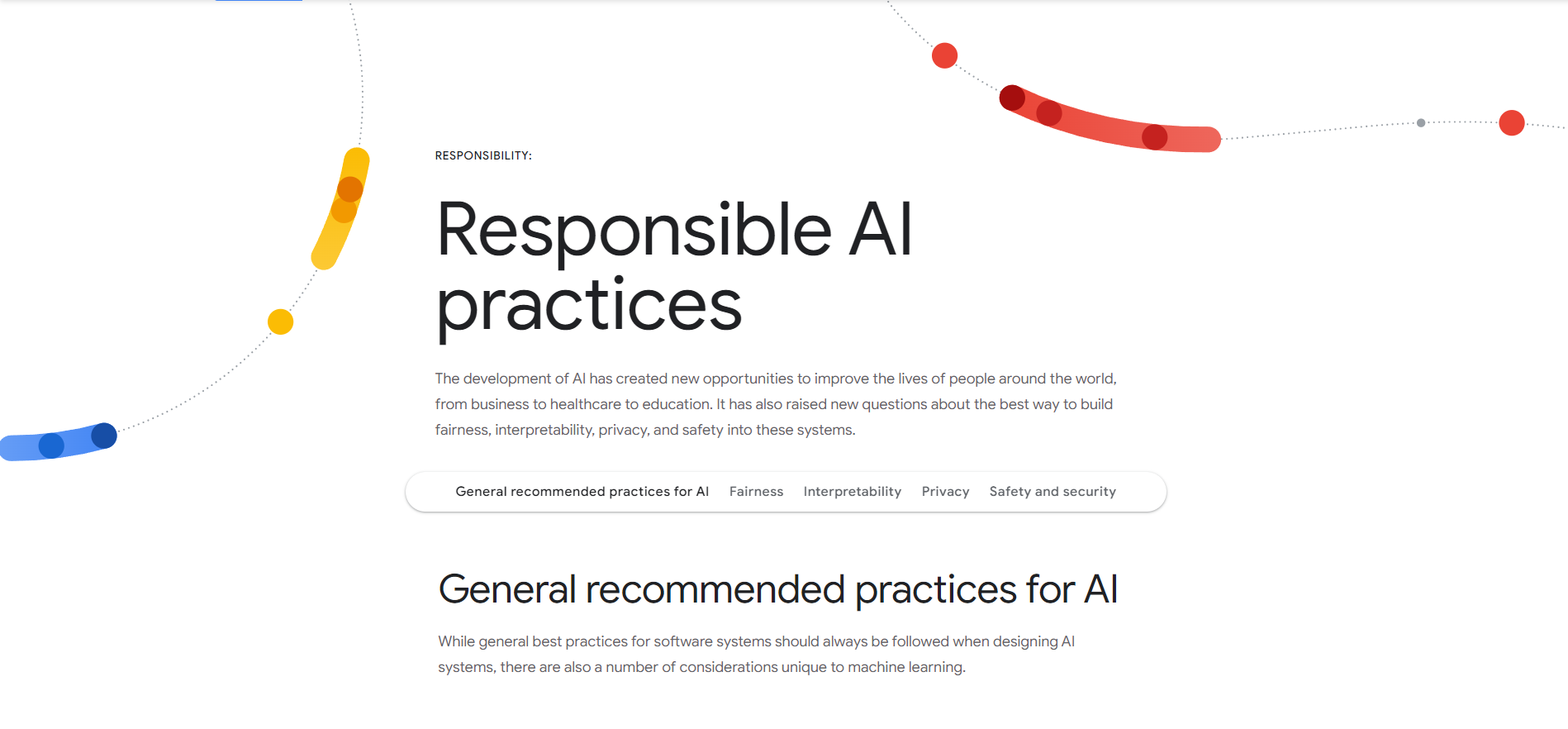
Source: Google AI
However, app developers should integrate AI responsibly by assessing potential harms early and putting appropriate safeguards in place. AI systems contain inherent biases from flawed training data that could affect app functionality. Rigorous testing and validation is vital.
AI-driven personalization should maximize relevance while adhering to privacy and ethical norms. Transparency in how user data is handled builds trust. Apps must also ensure equitable access across user demographics. Responsible AI adoption can make mobile apps safer, fairer and more trusted.
Important Considerations While Using AI:
- Transparency and Informed Consent
- Communicate the use and role of AI in Mobile App Development
- Bias Mitigation
- Regularly audit AI algorithms to identify and rectify biases
- Data Privacy and Security
- Strictly adhere to data and privacy regulations and industry standards
8) What is the Future of AI in Mobile Apps
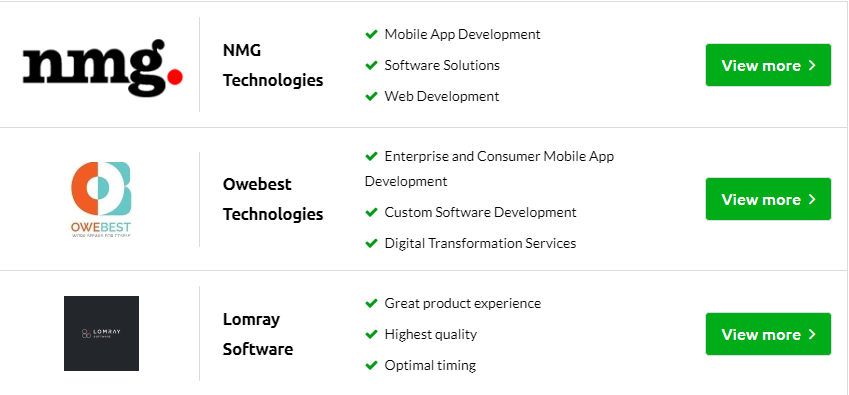
Source: Business of Apps
The future of AI in mobile apps promises personalized user experiences, empowered virtual assistants, streamlined automation, and the fusion of AI with augmented reality. Machine learning algorithms will tailor content, while smarter virtual assistants and AI-driven automation enhance efficiency. The marriage of AI and augmented reality will create immersive experiences, and advanced security measures will protect user data. This evolution signifies a shift toward a more intelligent and interconnected mobile app landscape, transforming how we engage with technology.
Personalized User Experiences: The AI Revolution in Mobile Apps
AI transforms mobile apps, tailoring content to individual preferences. The advanced algorithms understand user behaviours, delivering personalized and engaging experiences, marking a significant shift towards a user-centric app ecosystem.
Advanced Virtual Assistants: The Next Frontier in Mobile Interaction
AI-driven virtual assistants, powered by NLP and machine learning, respond with human-like comprehension. Proactively predicting user needs and seamlessly integrating with other apps, they evolve into indispensable digital companions.
Integration with Augmented Reality (AR): Redefining Mobile Experiences
AI and AR converge to reshape mobile app interactions. Recognizing real-world objects enhances immersive experiences, from gaming to navigation. The fusion opens unprecedented possibilities, transcending traditional interfaces for users to explore and engage with.
9) Will AI Replace Mobile App Developers
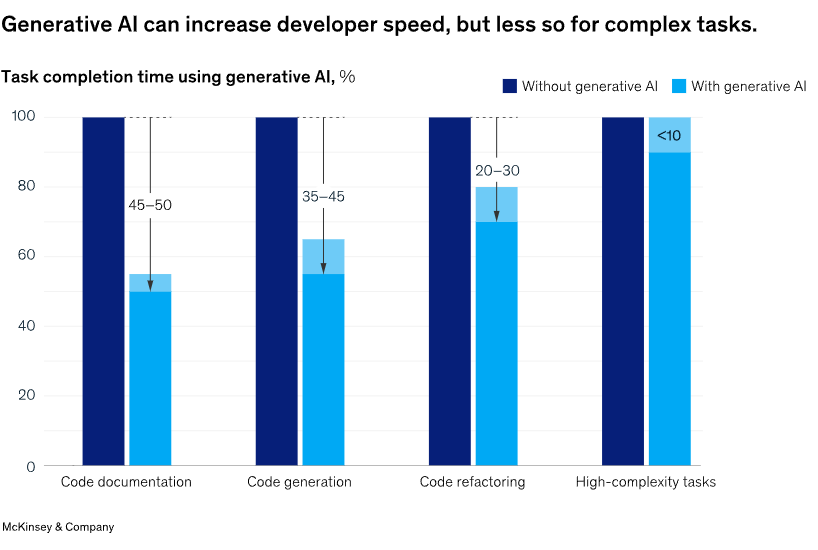
Source: Mckinsey
While AI is revolutionizing mobile app development, the idea of it entirely replacing developers remains unlikely. AI excels in automating repetitive tasks, enhancing efficiency, and generating code snippets. However, the creativity, problem-solving, and nuanced decision-making skills crucial in app development are deeply human. AI can be a powerful ally, speeding up processes and aiding in coding, but the symbiotic relationship between technology and human ingenuity is likely to persist, ensuring developers continue to play a central role in innovation and application design.
Enhanced Efficiency, Not Replacement:
AI streamlines tasks, accelerating development. Developers leverage AI for automation, focusing on creativity. It's a symbiotic relationship, with AI enhancing efficiency rather than replacing human ingenuity.
Human Ingenuity Unmatched:
AI lacks human creativity and nuanced decision-making. Collaboration between AI and human developers is essential for crafting innovative applications, each contributing unique strengths.
AI as a Valuable Ally:
In mobile app development, AI serves as a valuable ally. Automating routine tasks, offering predictive coding suggestions, and enhancing functionalities, AI collaborates with human developers, ensuring an efficient and dynamic development process.
10) How Will AI Impact the Next 5 Years of Mobile App Development
Over the next five years, AI's impact on mobile app development is poised to be transformative. Expect accelerated innovation with AI streamlining coding processes, enhancing user personalization, and boosting app functionality. Advanced analytics and machine learning will enable developers to create more intuitive and efficient applications. While AI won't replace human ingenuity, its integration will redefine the landscape, ensuring a future where mobile apps are smarter, more adaptive, and tailored to individual user needs.
4 Ways AI Will Impact Mobile App Development:
- Efficiency Boost
- Enhanced User Personalization
- Seamless Integration of Advanced Technologies
- Improved Security Measures
11) What are the Ethics of Using AI for Mobile App Development
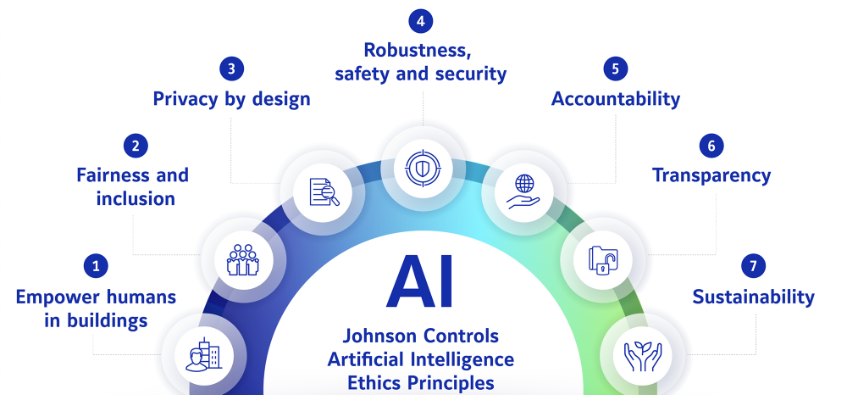
Source: Johnson Controls
Ethical considerations in AI for mobile app development are paramount. Striking a balance between innovation and user privacy, developers must ensure transparency in data usage and obtain informed consent. Bias mitigation is crucial to prevent discrimination, and robust security measures are imperative to safeguard user information. As AI's role expands, a commitment to fairness, accountability, and responsible AI practices becomes integral, ensuring a future where technological advancements align with ethical standards in mobile app development.
Transparency and User Consent:
Transparent communication on data usage and AI impact is crucial. Obtaining explicit user consent fosters trust, ensuring awareness and accountability in mobile app development.
Bias Mitigation:
Regular AI algorithm audits and a commitment to fairness minimize biases. Striving for inclusivity contributes to a more equitable technological landscape in mobile app development.
Data Privacy and Security:
Adhering to stringent regulations and implementing robust security measures is foundational. Prioritizing data privacy ensures ethical handling of user data, establishing trust in mobile app development.
12) What's Next
AI has become integral to streamlining and enhancing mobile app development workflows. In the coming years, codeless app builders based on AI will enable high-quality apps to be built without intensive programming knowledge. Sophisticated AI assistants will work alongside developers to radically boost productivity.
Real-time app adaptations through ML will deliver dynamic, personalized and contextually relevant experiences, moving apps from static to fluid software. However, developers need to proactively address the emerging risks of AI by designing appropriate training regimes, testing protocols and fail-safes.
Adopting AI responsibly and strategically will enable the creation of next-generation mobile apps that captivate users and deliver immediacy, intelligence, and convenience, all through superior design.
For any further questions on AI and its use within a business:
